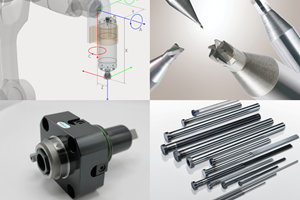Automation Alley: Recovering Together
Automation Alley’s mission is to grow the innovation cluster of Southeast Michigan. It creates business development opportunities and results for its members and stakeholders who share its values. By helping its members achieve success, Automation Alley aims to increase the quality of life in Michigan.
Automation Alley (Troy, MI), a southeast Michigan nonprofit organization, traces its roots back to the 1997 State of the County address delivered by Oakland County Executive L. Brooks Patterson. In this speech, Patterson unveiled his vision for a national marketing strategy to attract skilled, high-tech and cutting-edge businesses to the county. The announcement sparked the 1999 development of the Automation Alley organization originally composed of just 44 member organizations.
The nonprofit has come a long way since then, increasing its membership and developing into a vital resource for southeast Michigan. Automation Alley offers a variety of programs and services, including entrepreneurial and international business resources, talent initiatives and defense manufacturing programs. Through these services, its marketing campaigns, website and events, the organization has been instrumental in bringing growth and economic development to Oakland and the rest of the eight-county region which includes Detroit.
Automation Alley’s mission is to grow the innovation cluster of Southeast Michigan. It creates business development opportunities and results for its members and stakeholders who share its values. By helping its members achieve success, Automation Alley aims to increase the quality of life in Michigan.
Automation Alley opened its official headquarters in Troy, Michigan, in the fall of 2004 and expanded the facility in 2011. Today, the company employs 22 staff members, nine defense consultants and four interns and has expanded to nearly one thousand member organizations including businesses, educational institutions and government entities from the City of Detroit.
Looking back, the nonprofit’s growth may seem natural and easy; however, the organization has had to deal with the same problems that most U.S. businesses have in recent years. “We have faced economic issues that impacted our region and nation. Our auto industry was shaken to its foundations. The nation’s economy was hit hard,” says Executive Director Ken Rogers. With the highest number of advanced automotive industry jobs in the United States, southeast Michigan was hit hard.
But Automation Alley didn’t give up in the face of economic hardship. “We did not stand still,” states Rogers. Instead, the organization focused on helping its members cope. “We led the charge for diversification,” he says. “Military contracts, new international markets and other tools were used to bring business opportunities to our members.”
Automation Alley has launched a number of initiatives for recovery, focusing on the development of talent, technology and business relationships. For example, the organization offers symposiums on Modeling, Simulation and Visualization to educate teachers and professionals and its Manufacturing Committee hosts meetings every six weeks to encourage local and global business opportunities.
However, military contracts—specifically, defense contracts—remain one of the organization’s most successful efforts for recovery. Automation Alley coordinates four different defense programs to bring business opportunities to its members. The Diminishing Manufacturing Sources and Material Shortages (DMSMS) Program identifies manufacturers and material suppliers capable of filling part and material shortages, reverse engineers parts when needed and performs industrial base studies. The Small Business Innovation Research (SBIR) Program provides funding for small businesses to engage in federal research and development. The National Automotive Center (NAC) promotes shared technology programs for collaborative ground vehicle research. The organization also provides Sustainment Engineering Risk Assessment (SERA) reports, detailed studies of all the parts that can be repaired or replaced on a defense system.
These programs have allowed southeast Michigan businesses, particularly small businesses, to expand into the defense field and into new areas of manufacturing such as research and development. Automation Alley’s efforts have promoted business growth along with industry advancement. In addition to the defense programs, the nonprofit currently offers resources such as consulting services, the Adams Entrepreneur Fellowship, entrepreneurial resources and coaching, seed fund investments, international trade missions, office space and resources at the International Business Center, finance advisory solutions, Stage 2 Innovations funding and talent initiatives such as the IT Pathways grant.
For instance, the organization’s Trade Mission Program, established in 2001 with a grant from the U.S. Department of Commerce, has organized 15 trade missions to help small businesses boost sales through exports and promote Michigan exports overseas. Trade mission participants travel to a target country and participate in tours, matching meetings and networking opportunities with local businesses. Past trade mission countries have included Canada, China, Germany, Israel, Italy, Luxembourg and Brazil. The initiative has resulted in $188 million in contracts for regional companies and created more than 1,000 jobs since its inception.
Kyle Schwulst, founder and CEO of ElectroJet, participated in Automation Alley’s trade mission to China in 2006. Automation Alley was the first institutional investor in the company, which produces electronic engine controls for small engines, such as lawn mowers and scooters. Says Schwulst of the nonprofit, “Their guidance helped bring the company from a Michigan pole barn to a thriving organization with a global customer base.” China is now the company’s largest market.
The trade missions aren’t just about outward expansion, though; they have also been successful at bringing business back to Michigan. For instance, representatives from the Macomb County Department of Planning & Economic Development participated in a trade mission to Israel in 2009. “We had the privilege of meeting with representatives of Elbit Systems,” says Executive Director Stephen N. Cassin. “As a result, they opened an office here in Macomb County and we continue to work with them to help them grow their U.S. customer base.”
Automation Alley also seeks to build up businesses on a local level. Its Business Accelerator Program, launched in 2003, helps companies quickly turn their ideas into usable, marketable technology solutions through funding, business plan and strategy development support and expert mentoring. The program has four separate components:
• Automation Alley’s Pre-Seed Fund offers qualified southeast Michigan technology start-ups up to $250,000 in funding. The program is geared toward Competitive Edge Technologies companies involved in life sciences, advanced automotive, manufacturing and materials, homeland security and defense or alternative energy technology.
• The State of Michigan Pre-Seed Fund provides early-stage capital for high-tech start-ups in the same industries preparing to accept outside investment.
• The Microloan Program provides loans of $10,000 to $50,000 for private Michigan companies with ownership of or licensing rights to innovative technology.
• The Michigan Supplier Diversification Fund is geared toward suppliers seeking to diversify into emerging industries in light of the economy’s negative effects on suppliers.
To date, the Business Accelerator initiatives have provided $6.56 million for 33 southeast Michigan companies. Cielo MedSolutions LLC, develops health care technology, was a recipient of Automation Alley’s pre-seed funding. “Automation Alley was a wonderful partner,” says co-founder and CEO David Morin. “It provided a part of our initial seed funding and allowed us to securing funding commitments from other investors.”
In addition to promoting business growth and collaboration, Automation Alley also provides a physical space for building these relationships. The International Business Center, a 3,200-square-foot addition to the Troy, Michigan headquarters, offers open office space, an executive board room a collaboration center, a video conference center and a private multimedia office. These resources and other fee-based services are available for visiting international companies and Michigan companies pursuing global markets.
The IBC has attracted 10 high-tech companies to its facilities since 2011: Sunlogics (Canada), Van Rob Inc. (Canada), Elbit Systems of America, LLC (Israel), e-Xstream engineering, LLC (Luxembourg), Heck + Becker Corporation (Germany), Inphodrive US Inc. (Israel), ED USA, Corp. (Italy), Fooke GmbH (Germany), Jiangsu Hai’an Development Zone (China) and Stola NA (Italy).
Automation Alley’s most recent initiative is the Technical Talent Development program, started with a $5 million grant from the U.S. Department of Labor. The program, which has not yet been launched, will offer training for workers. According to Rogers, “Through this program, Automation Alley and its partners—including companies committed to hiring local talent—will provide flexible, employer-driven training to U.S. workers targeted to specific occupations at the H1B level or higher.”
Through these programs and others, Automation Alley hopes to become the number-one technology organization in the country. The future looks bright for both the nonprofit and its members. “The biggest problem we face is successfully managing the growth we are experiencing,” says Rogers. And these days, that’s a good problem to have.
For More Information
Automation Alley / (248) 457-3200
kozlowskik@automationalley.com / automationalley.com
Related Content
MMT Chats: Eliminating the Noise to Stay Focused on the Customer
Metro Mold & Design joins me to discuss the value of the 80/20 rule as a business strategy, its talented cross-functional team, the role of automation in mold building and molding, and the continuing impact of COVID-19.
Read MoreQuality Tool & Die Enhances Performance With Advanced EDM and Milling Technologies
The adoption of Mitsubishi wire and sinker EDMs, along with the OPS Ingersoll five-axis milling machine with automated cells, has enabled unmanned operations and improved precision. As a result, QTD has expanded its facility, grown its workforce and increased its business by 10-15% annually.
Read MoreHow to Automate Process and Design
Moldmakers can improve their operations and stop wasting time by taking these six steps for process and design automation.
Read MoreTechnology Roundup: New/Improved Technologies You Don't Want to Miss
With all the technology joining the market, moldmaking is a versatile, ever-evolving industry. As such, this technology roundup has no specific theme — it features a variety of products for applications and solutions across the industry.
Read MoreRead Next
The American Mold Builder’s Association: Rebranding and Building Value
The hope is that its members are able to reach out to the association on almost any issue related to the industry—whether it is operational, financial or technical.
Read MoreHow to Use Strategic Planning Tools, Data to Manage the Human Side of Business
Q&A with Marion Wells, MMT EAB member and founder of Human Asset Management.
Read MoreReasons to Use Fiber Lasers for Mold Cleaning
Fiber lasers offer a simplicity, speed, control and portability, minimizing mold cleaning risks.
Read More
.jpg;width=70;height=70;mode=crop)


















